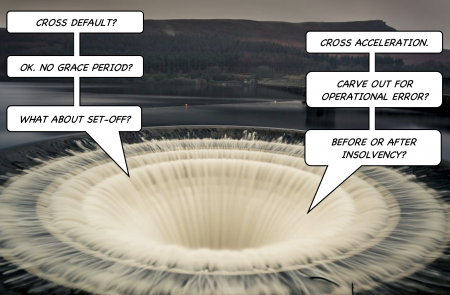Oubliette: Difference between revisions
Amwelladmin (talk | contribs) No edit summary |
Amwelladmin (talk | contribs) No edit summary |
||
| (20 intermediate revisions by the same user not shown) | |||
| Line 1: | Line 1: | ||
{{a|negotiation|[[File: | {{a|negotiation|[[File:negotiation oubliette.png|center|450px|thumb|“All right, well what about [[cross acceleration]]? With a [[grace period]]? And a carve-out for operational error?”]]}}{{d|Oubliette|/ˌuːblɪˈɛt/|n|}} | ||
{{oubliette capsule}} | |||
====Negotiation oubliettes==== | |||
Oubliettes are common when negotiating quotidian commercial agreements. They are a consequence of the agency problem. While this can be alarming for commercial counterparties themselves, their [[Negotiator|negotiators]] will carry on, oblivious, sometimes for months or even years, as long as there are rules to follow, details to tease out and contingencies to address, however microscopic or improbable. | |||
An inter-affiliate stock lending agreement famously fell into an oubliette in Zurich in 2014. None of the negotiators have been heard from since though, as far as anyone “on the outside” knows, discussions are still ongoing and progressing well. | |||
Negotiation oubliettes are often prompted by the lawyer’s equivalent of the “clabby” conversation:<ref>{{br|The Meaning of Liff: The Original Dictionary Of Things There Should Be Words For}}, by {{author|Douglas Adams}} and {{author|John Lloyd}}.</ref> one struck up by an [[rent-seeker|agent]] to appear busy while avoiding difficult work, wasting time and provoking maximum forward confusion. | |||
Into the oubliette you will go, taking the whole negotiation with you, the moment anyone proposes to accommodate any of the infinite [[tail event]]s that in logical theory ''could'' but in recorded history never ''have'' come about. Seeing an oubliette coming early is vital, as is the right response, since falling into it is very easy to do. The notion of a “clabby conversation” translates very well into the world of [[contract negotiation]]. | |||
So let’s look at the classic case: [[DUST]]. Warning: we are about to drop into an unseemly amount of detail about something that is very, ''very'' [[Tedium|dull]], but that is the very point: by seeing how dull these holes in the ground are, we can learn how to avoid falling into them. Remember: [[Tedium is particular, not generic|tedium is ''always'' specific, never general]]. | |||
====The classic negotiation oubliette: Default Under Specified Transaction==== | |||
{{premiumsummarygeneral|*[[pjc:Default Under Specified Transaction - ISDA Provision#DUST as the quintessential negotiation oubliette|DUST as the quintessential negotiation oubliette]]}} | |||
{{sa}} | {{sa}} | ||
*[[Abyss]] | *[[Abyss]] | ||
*[[Anal paradox]] | |||
*{{isdaprov|Default under Specified Transaction}} | |||
{{ref}} | |||
Latest revision as of 08:02, 25 August 2024
|
Negotiation Anatomy™

|
Oubliette
/ˌuːblɪˈɛt/ (n.)
A naturally occurring subterranean cavern that forms when the opinionated gather to argue about trifles. Given enough nest-feathering, posturing and guano, even the most robust topic will tend to fray and weaken and may in time collapse: those discussing it suddenly find themselves in a dungeon of their own making, not knowing how they got there, but rather enjoying it all the same.
Oubliettes have a cosmological quality: like any black hole, they are impossible to see directly. We detect them only by their signature detritus: crushed aspirations of clarity and elegance, swirling around an event horizon of pedantry like so many gossamer dreams of greatness, gurgling around a galaxy-sized plughole. We enter these space-tedium singularities often, but always unwittingly, and it is only when scrabbling desperately for a way back out that we realise just what we have fallen into.
Negotiation oubliettes
Oubliettes are common when negotiating quotidian commercial agreements. They are a consequence of the agency problem. While this can be alarming for commercial counterparties themselves, their negotiators will carry on, oblivious, sometimes for months or even years, as long as there are rules to follow, details to tease out and contingencies to address, however microscopic or improbable.
An inter-affiliate stock lending agreement famously fell into an oubliette in Zurich in 2014. None of the negotiators have been heard from since though, as far as anyone “on the outside” knows, discussions are still ongoing and progressing well.
Negotiation oubliettes are often prompted by the lawyer’s equivalent of the “clabby” conversation:[1] one struck up by an agent to appear busy while avoiding difficult work, wasting time and provoking maximum forward confusion. Into the oubliette you will go, taking the whole negotiation with you, the moment anyone proposes to accommodate any of the infinite tail events that in logical theory could but in recorded history never have come about. Seeing an oubliette coming early is vital, as is the right response, since falling into it is very easy to do. The notion of a “clabby conversation” translates very well into the world of contract negotiation.
So let’s look at the classic case: DUST. Warning: we are about to drop into an unseemly amount of detail about something that is very, very dull, but that is the very point: by seeing how dull these holes in the ground are, we can learn how to avoid falling into them. Remember: tedium is always specific, never general.
The classic negotiation oubliette: Default Under Specified Transaction
|
Premium content
Here the free bit runs out. Subscribers click 👉 here. New readers sign up 👉 here and, for ½ a weekly 🍺 go full ninja about all these juicy topics👇
|